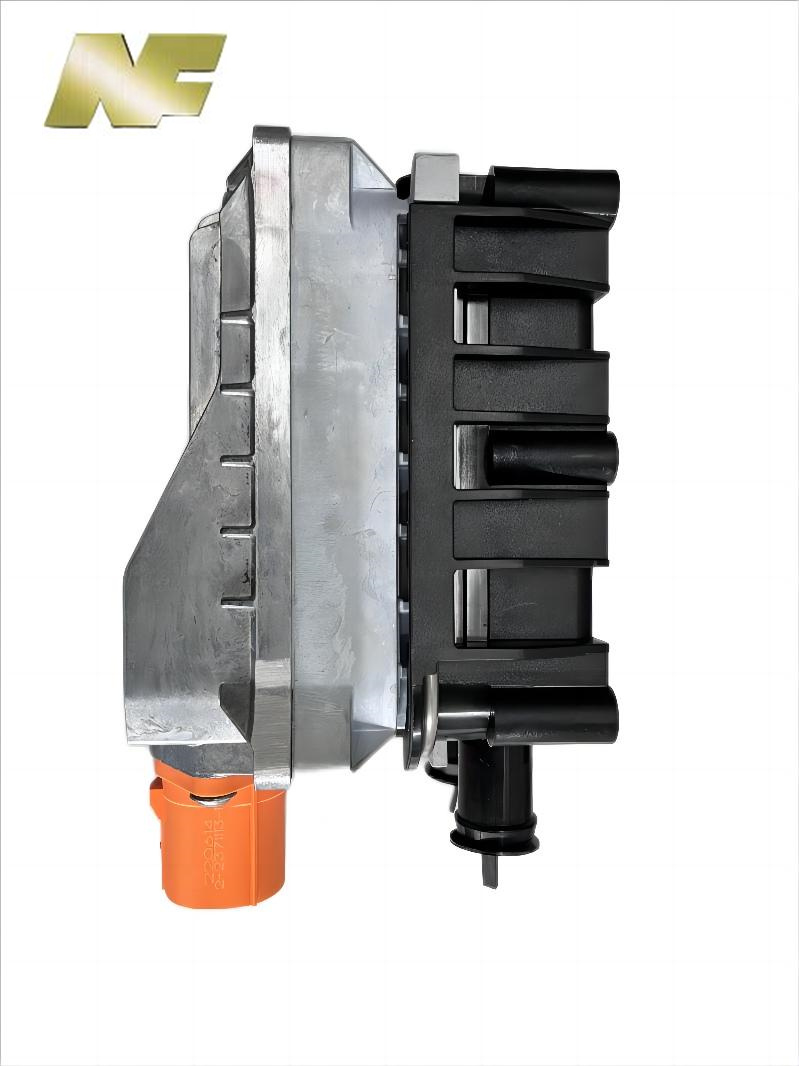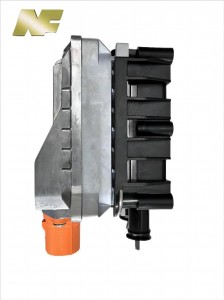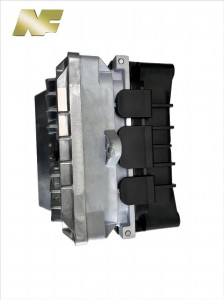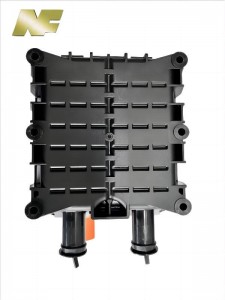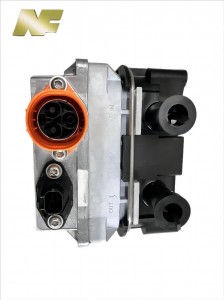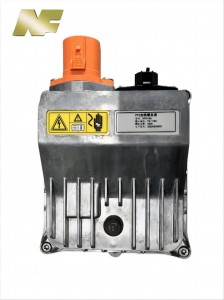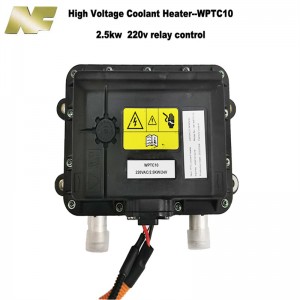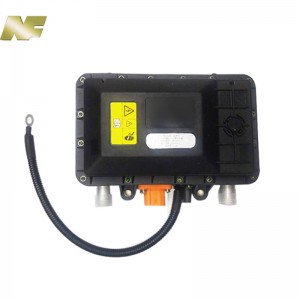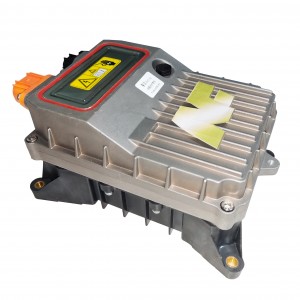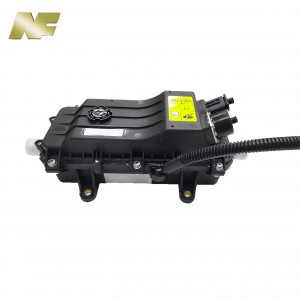NF 3KW DC80V 12V PTC Coolant Heater For EV HVCH
Technical Parameter
| Low voltage range | 9-36V |
| High voltage range | 112-164V |
| Rated power | rated voltage 80V, flow rate 10L/min, coolant outlet temperature 0 ℃, power 3000W ± 10% |
| Rated voltage | 12v |
| Operating temperature | -40℃~+85℃ |
| Storage temperature | -40℃~+105℃ |
| Coolant temperature | -40℃~+90℃ |
| Protection grade | IP67 |
| Product weight | 2.1KG±5% |
Detail
For pricing, 2D and 3D drawings, CAN protocols and other CAD files please contact us promptly, thank you!
Description
As demand for energy-efficient and environmentally friendly vehicles continues to surge, manufacturers continue to look for innovative solutions to improve the overall performance of electric vehicles (EVs). In this quest, electric coolant heaters, specifically high-voltage PTC electric heaters, have become game-changers. These advanced heating systems are revolutionizing the way we heat our vehicles, offering a variety of advantages over traditional methods. In this blog, we’ll delve into the world of electric coolant heaters, explore their capabilities, and discuss the benefits they bring.
1. Basic knowledge of electric coolant heater:
Electric coolant heaters, also known as high-pressure PTC heaters, are specialized heating systems designed for electric vehicles. These heaters rely on Positive Temperature Coefficient (PTC) technology to provide efficient and fast heating in cold weather conditions. Unlike traditional heaters, electric coolant heaters do not require a constant heat source (such as an engine) to distribute heat.
2. Understand PTC electric heater technology:
The key component of the coolant electric heater is the PTC element, which is composed of conductive ceramic materials. When current passes through a PTC element, its resistance increases in proportion to temperature. This self-regulating feature makes PTC heaters safe and efficient because they automatically adjust power output based on surrounding conditions. Additionally, PTC technology eliminates the need for excessive wiring and complex control systems, resulting in a simpler and more reliable heating solution.
3. Functions and advantages of electric coolant heater:
a) Efficient heating performance: The electric coolant heater provides fast and consistent heating, allowing electric vehicles to warm up quickly even in extreme weather conditions. This is crucial as it helps reduce battery stress and improves overall energy efficiency, thereby increasing the range of electric vehicles.
b) Reduced energy consumption: Unlike conventional heating systems that draw power from the vehicle battery, electric coolant heaters utilize high-voltage power. This means the heater can operate independently without affecting the energy stored in the vehicle's battery. By reducing energy consumption, electric vehicles equipped with electric coolant heaters greatly help extend their range and optimize performance.
c) Environmental Sustainability: Electric coolant heaters offer a more environmentally friendly alternative to traditional heating systems as they eliminate the need to burn fossil fuels. Operating solely on electricity, these heaters reduce harmful emissions and support the transition to a greener, cleaner transportation sector.
d) Remote heating capability: One of the salient features of electric coolant heaters is their ability to be pre-programmed and remotely controlled. Electric vehicle owners can conveniently activate the heater using a mobile app or key fob, ensuring a warm cabin temperature is maintained before entering the vehicle. This feature not only improves comfort, but also eliminates the need to idling the car, further reducing unnecessary energy consumption and emissions.
e) Maintenance and service life: Electric coolant heaters have a longer service life compared to conventional heaters, mainly because they do not rely on the combustion process. Additionally, because these heaters feature efficient and durable PTC technology, they require minimal maintenance, thereby reducing maintenance costs for EV owners.
4. Electric Coolant Heater: A Essential for Electric Vehicles:
As the popularity of electric vehicles continues to soar, the need for effective heating solutions has become critical. Electric coolant heaters play a vital role in enhancing the overall driving experience, especially in colder regions. They provide convenience, energy efficiency and environmental sustainability by providing instant heat without relying on the vehicle's internal combustion engine.
In summary:
Electric coolant heaters powered by high-voltage PTC technology are changing the way vehicles heat their cabins, offering significant advantages over conventional heating systems. From efficient and fast heating performance to reduced energy consumption and increased sustainability, these innovative heaters are paving the way for a greener and more enjoyable driving experience in the electric vehicle sector. With its remote control capabilities and long lifespan, electric coolant heaters are becoming a necessity for all electric vehicle enthusiasts. Embrace the future of vehicle heating with electric coolant heaters and experience the comfort and efficiency they offer you.
Packaging & Shipping


Application


FAQ
1. What is an electric coolant heater and how does it work?
- An electric coolant heater is a device used to heat the coolant in a vehicle's engine. It works by using electricity to heat coolant before it circulates through the engine, ensuring the engine reaches its optimal operating temperature faster and more efficiently.
2. What are the benefits of using an electric coolant heater?
- Using an electric coolant heater has several advantages, such as reducing engine wear by shortening warm-up time, improving fuel efficiency and reducing emissions, providing a more comfortable interior temperature when starting the vehicle, and preventing engine damage due to : The cold begins.
3. Can an electric coolant heater be installed in any vehicle?
- Electric coolant heaters can be installed in most petrol, diesel and hybrid vehicles. However, specific compatibility may vary based on the make and model of your vehicle, so it is recommended that you consult the manufacturer or a professional technician for guidance.
4. How long does it take for the electric coolant heater to heat the engine?
- The warming time provided by an electric coolant heater may vary depending on ambient temperature and engine size. Typically, it takes about 1 to 2 hours for the heater to fully warm the engine before starting the vehicle.
5. Can electric coolant heaters be used in extreme cold weather conditions?
- Yes, electric coolant heaters are particularly beneficial in extreme cold weather conditions as they help prevent engine coolant from freezing and help maintain optimal engine temperature, ensuring it stays smooth even in freezing temperatures of startup.
6. Will using an electric coolant heater consume a lot of electricity?
- Electric coolant heater designed to save energy. While they do consume electricity during operation, they are designed to consume minimal power, ensuring minimal impact on the vehicle's electrical system and battery life.
7. Is it necessary to use an electric coolant heater year-round?
- The use of electric coolant heaters is most common in cold weather conditions. However, it is not necessary to use it year-round, especially in areas with mild climates. It is recommended to use it during cold winter months or when the ambient temperature is below freezing.
8. Can an electric coolant heater be used as a stand-alone heating system for a vehicle?
- No, electric coolant heaters are designed primarily to heat engine coolant before starting the vehicle. It is not suitable for use as a stand-alone heating system to heat the vehicle interior.
9. Can electric coolant heaters be retrofitted on older vehicles?
- In many cases, it is possible to retrofit an electric coolant heater on older vehicles. However, the installation process may vary depending on the make and model of the vehicle, and it is recommended to consult a professional technician to determine the feasibility of retrofitting an electric coolant heater.
10. Are there any maintenance requirements for electric coolant heaters?
- Electric coolant heaters generally require minimal maintenance. It is recommended that the heater and its components be inspected regularly for signs of damage or wear. Additionally, following the manufacturer's maintenance and care guidelines ensures optimal performance and longevity of your electric coolant heater.

